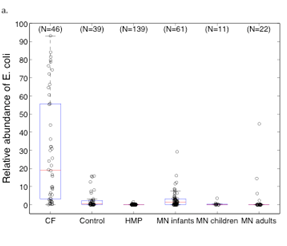Children with the genetic disorder cystic fibrosis (CF) have disease in their lungs and GI tracts. Most microbiologists studying CF focus on the bacteria infecting the lungs of people with CF; by comparison, the microbes in the GI tract- the GI microbiota- have received very little attention.
Children with CF have difficulty absorbing nutrients and, as a result, with growth and with their GI and overall health. In all people, the GI microbiota play important roles in maintaining GI tract health and in processing and absorbing nutrients. Therefore, the GI microbiota in children with CF could contribute to early growth and disease.
We recently showed that the GI microbiota in very young children with CF were significantly different from those in children without CF (see figure). These different microbiota correlated with measures of both nutrient absorption (stool fat content) and inflammation (calprotectin). These results support the concept that the GI microbiota are either impacted by CF GI dysfunction, contribute to that dysfunction, or both.
We are currently investigating the GI microbiota among 250 infants with CF over the first year of life, and their relationship with the growth and health of those infants. We are also trying to understand how these microbiota differences contribute to health and disease in these children using in vitro and animal models.
(Legend) The stool microbiota of children with CF are significantly different from similarly-aged children without CF. Here, one of the most striking differences is shown: The relatively high abundance of the bacterium Escherichia coli compared with children without CF in this study (control), and those found in previous, published studies of GI microbiota in healthy children and adults (HMP, human microbiome project; MN, a multinational study of stool microbiota- Yatsunenko T, Nature 2012; 486:222–227.)
From Hoffman, LR et al., Clin Infect Dis., 58(3):396-399.



